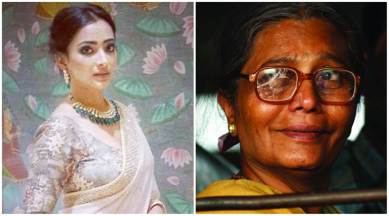Click here to follow Screen Digital on YouTube and stay updated with the latest from the world of cinema.

Money has no religion. Money does not belong to any class or creed. Neither it belongs to a gender nor an age. Money decides fate. Money also decides status. Money buys you food and money buys a basic necessity like water too.
Humans, being the only race to pay for living on this planet, have over the centuries become dependent on money. But what if money becomes a curse? Just like too little money can become a problem, so can too much money.
My recommendation this week is 90 minutes Marathi film 1000 Rupee Note or Hazaranchi note written and directed by Shrihari Sathe, available on Netflix.
The film starts with establishing shots of the village Phoolumbari in Vidharbha district of rural Maharashtra, with a local folk song playing in the background. After the song ends, the film’s protagonist, an almost seventy-year-old Parvati (Usha Naik) – fondly known as Budhi or old lady in the village – is seen walking down the road. Budhi limps to the cobbler’s shop, to mend her footwear. The cobbler, familiar with the old lady, tells her to get a pair of new footwear, as her footwear is beyond repair. She pays him half and mends the footwear herself with the cobbler’s tools. In the next few scenes, it is understood that she has little or almost no money. She bargains for milk, jaggery, bread yet welcomes her neighbour for a cup of tea with a smile. Her neighbour a mid-thirties Sudama (Sandeep Pathak) lives with his wife and children in the adjacent hut and takes care of Budhi like her own son. After getting no answer from the government for funds and ashamed for the money he owned, her son – a farmer- had committed suicide a year ago, leaving Budhi lonely and in need for money. Budhi works as a house help in nearby wealthy houses and manages with little money but is never shown borrowing it.
The course of the film changes when the entire village is invited for the local politician’s speech for the upcoming election. Otherwise uninterested villagers spruce up for the speech, as dinner is promised by the political party for everyone who attends it. Budhi along with Sudama and his family head for the speech in their fineries. As promised the villagers are served dinner, after the politician makes promises for basic rights like electricity, roads, etc. to the villagers. That, if they vote for him. After picking up their dinner packets Sudama takes Budhi back to the stage, where the politician is distributing 100 rupees notes to the villagers. When the politician learns that Budhi’s son committed suicide last year, which got media’a attention, the politician shoves few, precisely four 1000 rupees notes in Budhi’s hand. Thrilled and scared with so much money and the entire village’s attention, Budhi decides to spend the money. When Sudama and Budhi head to the town market for buying things, Budhi realises that she is not able to spend her big note as nobody has any change. What follows only adds more twists to Budhi and Sudama’s expedition.
Shrihari Sathe’s powerful debut may surprise the audience for fine detailing and matured story execution. The film looked like it was made by a seasoned director, when there are nuances like Budhi trying to save match sticks because she doesn’t have enough money to waste them or plucking flowers and tucking them in the hair bun or the fact that despite having so many problems, Budhi never ceases to smile and welcome the new day. Such moments made the film real and credible. Veteran actress Usha Naik embodies the character effortlessly, paying attention to details like her body language, her body movements like a village woman who probably wore a saree all her life to receiving money awkwardly from a politician to sweeping the floors. Such a delight! Sandeep Pathak as Sudama and other actors play their pats honestly and very well. Shot well, edited well and with music and sound appropriately placed, makes this film a great watch.
The film rates 7.1 at the IMDB and won jury best film award at the Dada Saheb Phalke festival in 2015 and many other local and international accolades. Just wondering, what would have happened if the film was made post 2016 demonetisation? How would Budhi get change for 2000 rupees note, forget 1000.
Send your feedback to shwetabasuprasad.column@gmail.com
(Shweta Basu Prasad is a national award-winning actor, famed for Makdee, Iqbal and television show Chandra Nandini. Shweta is a graduate in mass media and journalism.)
Click here to follow Screen Digital on YouTube and stay updated with the latest from the world of cinema.